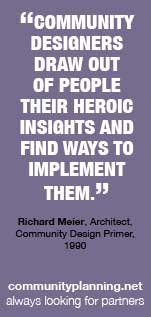Community Planning: Methods
Development trust
- description
- more detail
- more pictures
Development trusts provide a mechanism for communities to undertake regeneration and development projects themselves. They make it possible to achieve the long-term sustained effort that is needed to evolve a community's own plans and put them into action.
Development trusts are community-based organisations working for the regeneration of their areas. They may undertake a specific project or, more likely, a range of economic, environmental, cultural or social initiatives.
Development trusts are independent bodies with management structures ensuring accountability to local people. They are not-for-profit bodies, often with charitable status, making it possible to attract resources from public, private and charitable sectors.
Administrative structures are designed to allow development trusts to own and manage property, employ staff and develop efficient project management capability.
.
Development trusts are community-based organisations working for the regeneration of their areas. They may undertake a specific project or, more likely, a range of economic, environmental, cultural or social initiatives.
Development trusts are independent bodies with management structures ensuring accountability to local people. They are not-for-profit bodies, often with charitable status, making it possible to attract resources from public, private and charitable sectors.
Administrative structures are designed to allow development trusts to own and manage property, employ staff and develop efficient project management capability.
.
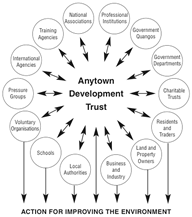
Concept
Bringing together national, regional and local agencies in the public, private and voluntary sectors to promote action by local people to improve the environment.
Tips
- Funding is easiest to secure at the outset in the form of grants from government and local authority regeneration budgets. The challenge is to build up a secure asset base, some committed sponsors and income generating capacity before grants expire. Having a linked trading company is often useful to make it possible to earn income without losing charity status.
- Having a clear focus, based on local priorities, is important to attract support. Select a name, slogan and style to reflect this.
Costs
- Essential core costs: Manager's wages, premises, office running. Desirable to have several staff and a project seed fund. Aim at £100,000 per annum but be prepared to start with volunteers.
Sample promotional leaflet
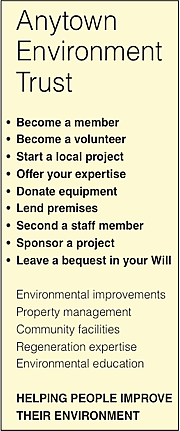
Key components: Name of organisation; what it can do; how people can get involved; slogan summarising aim..

Key components: Name of organisation; what it can do; how people can get involved; slogan summarising aim..
Checklist: Typical development trust activities
- Administering grant schemes
- Building and managing workspace
- Developing community plans
- Environmental education programmes
- Holding training programmes
- Organising competitions
- Organising events
- Preserving historic buildings
- Promoting community development
- Providing sports and recreational facilities
- Running childcare centres
- Running award schemes
- Running resource centres
- Setting up and managing arts facilities
- Setting up community enterprises
- Supporting community groups
- Supporting small businesses
Inspiration
-
"The strength of development trusts is that they can demonstrate the creativity and added competence that comes from bringing together expertise and enthusiasm from public, private, voluntary and community sectors."
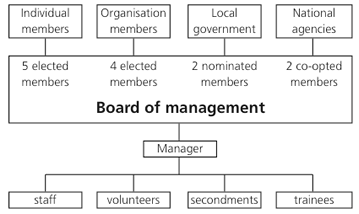
Typical democratic management structure
Elected local members have a majority on the Board to ensure local accountability. Elections are usually held annually with members serving two years each.
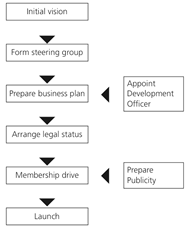
Setting up
The main steps. likely to take at least one year.
